#Alcestis
Text
obsessed with stories where the message is that you can't bring someone back from the dead even if you can bring someone back from the dead
#the ones where people come back from the dead *to tell their loved ones they cant come back from the dead*...#orpheus and eurydice#iliad 23#alcestis#the set of songs that includes the unquiet grave and sweet williams ghost and lowlands away and the two brothers#mine
96K notes
·
View notes
Text

Apollo helping his boyfriend get a wife be like
Based on this
Apollo's design
Admetus and Alcestis' designs ( +sumary of their myth)
#Apollo#admetus#alcestis#greek myth art#greek gods#greek heroes#greek mythology#tagamemnon#my artwork#my art#artist on tumblr#digital art#meme#lovers of apollo
969 notes
·
View notes
Text

Alcestis by Euripides (tr. Richard Aldington)
#alcestis#euripides#richard aldington#quote#typography#literature#dark academia#classic academia#dark things#the self#bodymind#ancient greek literature#ancient greek mythology#mythology#plays
157 notes
·
View notes
Text
ἐγὼ μὲν οὐκ ἔχοιμ᾽ ἂν εὖ λέγειν τύχην,
χρὴ δ᾽, ἥτις ἐστί, καρτερεῖν θεοῦ δόσιν
"I could never bring myself to say that fate is kind,
but we must endure what the gods give, whatever that may be."
— Euripides, Alcestis
#classics#classical antiquity#antiquity#ancient greece#ancient greek#greek tragedy#classical literature#classical language#euripides#alcestis#euripidesposting#translations#greek translations
144 notes
·
View notes
Text
Alcestis, watching Apollo & Cyrene: Anyway why is archery so fucking sexy
Admetus, also watching Apollo & Cyrene: Shoulders and absolute physical control. next question.
#triple a#apollo x cyrene#source: tumblr#yes this is meant to be poly#100% possible because Cyrene won Pelias's funeral games#and Pelias is Admetus's father in law#so it stands to reason he was there#greek mythology#tagamemnon#cyrene#admetus#alcestis#apollo
51 notes
·
View notes
Text
Wanna share some newly found Admetus x Apollo crumbs!! because I just love them and they never fail to make me go feral every time I read something about them!!
This time it's from a latin poem "Alcestis Barcinonensis", and as the name suggests it narrates the story of Alcestis. But it also has Admetus and Apollo having a conversation with each other - which I've never seen before in any of the texts, so this poem has stirred my feels (again).
It starts with Admetus calling upon Apollo to answer his questions about his future:
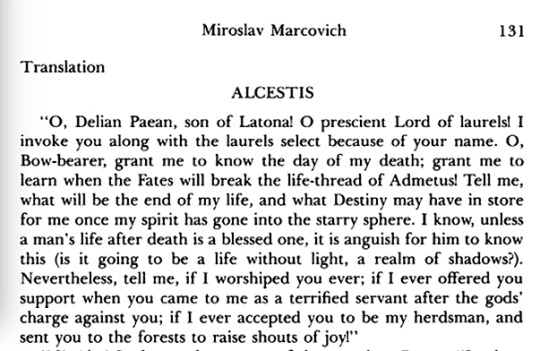
"If I worshipped you ever; if I ever offered you support when you came to me as a terrified servant after the gods' charge against you"
Just...Imagine being Admetus. You worship a god ardently, and that god turns up at your door step as your servant (a terrified servant) and you get to shelter him, accept him. Support him at his lowest. And this god falls in love with you and is serving you in a way that feels like he is worshipping you. ("I am myself godly, and in Admetus, son of Pheres, I found a godly man." - Apollo in Euripides' Alcestis) It is dishonorable for the god but he doesn't care, he is ready to go to any extent to keep you happy.
A commentary on this poem points out how Admetus' addresses Apollo in this way with an intent of binding the god to himself:
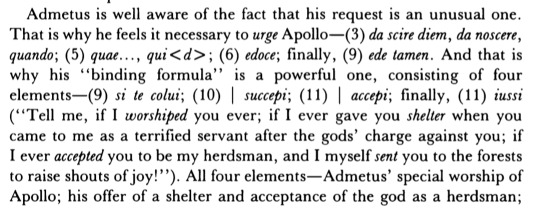
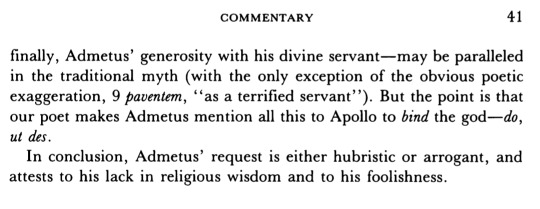
I'm kinda loving how this characterises Admetus as being selfish, or at least insensitive with his request to Apollo. Yes he knows Apollo is no longer his slave, but he knows very well he can still bind Apollo to him and he doesn't hesitate to take advantage of it.
Apollo doesn't have to oblige, because he has already served Admetus exceptionally well during his years of servitude. Even afterwards, he has done enough favours for Admetus - helped him get a wife, saved him from Artemis' wrath. But of course, he still comes to do him yet another favour. It's very fitting that their story is used as an example for servitium amoris (slavery of love) by other poets like Ovid and Tibullus. Despite being free, in his heart he's still a slave to Ademtus' love. Maybe that's why Apollo lets himself get easily bound when Admetus requests for it. He probably knows that this is not entirely fair, but he still answers it because perhaps everything he has done so far is still not enough for him (or perhaps yielding to Admetus' requests has become a fond habit of his)
Back to the poem, this is Apollo's answer to Admetus:
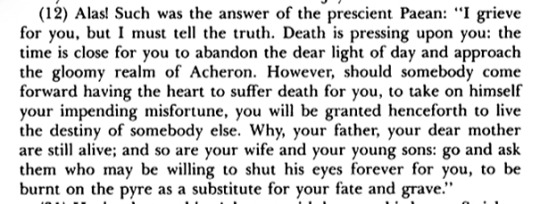
"I grieve for you, but I must tell you the truth. Death is pressing upon you."
Apollo says he is already grieving for Admetus. He must have known that for a while huh. For how long has he been mourning Admetus in secret? :')
He not only answers the questions, but also goes beyond by letting Admetus know how to escape death - something Admetus hadn't asked for (but that probably would have been Admetus' next request). It seems like Apollo is just as desperate to save Admetus as Admetus is to save himself, and maybe he was waiting for the day Admetus would selfishly ask this of him.
Admetus has to find someone to die in his place, so that he can live longer. Given how in Ovid's poem Apollo wishes to renounce his godhood so that he could die with Hyacinthus, I don't think it would be a stretch to imagine that if it was possible, Apollo would have given his years (at least some of his years) to Admetus. Instead, Apollo tells him to ask his parents, wife and children. Where both his parents refuse, Alcestis gladly agrees to die in her husband's place.
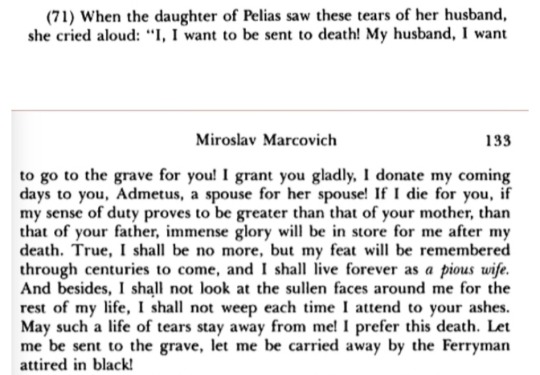
Alcestis agrees to die, first and foremost because it will bring her glory. She will be praised and remembered for being a pious wife. And she will not have to live the life of a widow. That doesn't make her sacrifice any less noble or selfless at all...
But the thing is, while both Apollo and Alcestis go out of their way to save Admetus, Alcestis' act of saving her husband brings her glory and honor, but Apollo's part in saving Admetus only brings him dishonor and scorn from other gods. But that doesn't stop Apollo from still trying to do something for Admetus, to save him in whatever way possible. In Alcestis, Apollo even tries to save Alcestis by negotiating with Thanatos. All for the sake of Admetus.
Like just how much can a god love a mortal?

#Admetus#Alcestis#Apollo#I just fucking love them so much#this is true love#mine#AAA#yes that's the tag for them
110 notes
·
View notes
Text
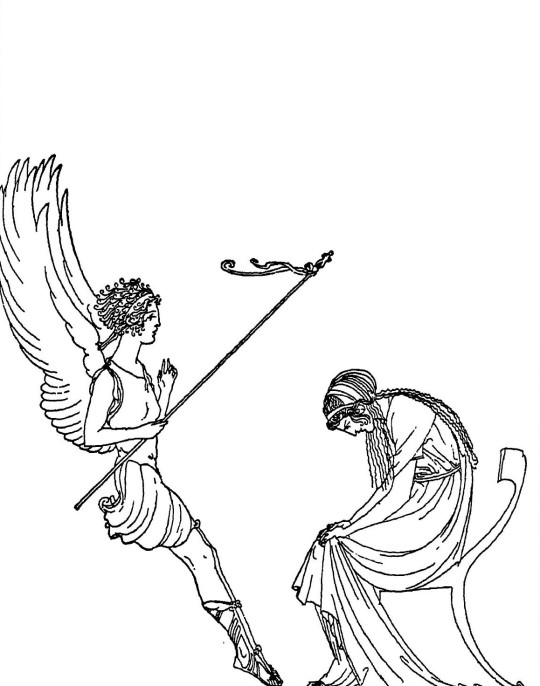
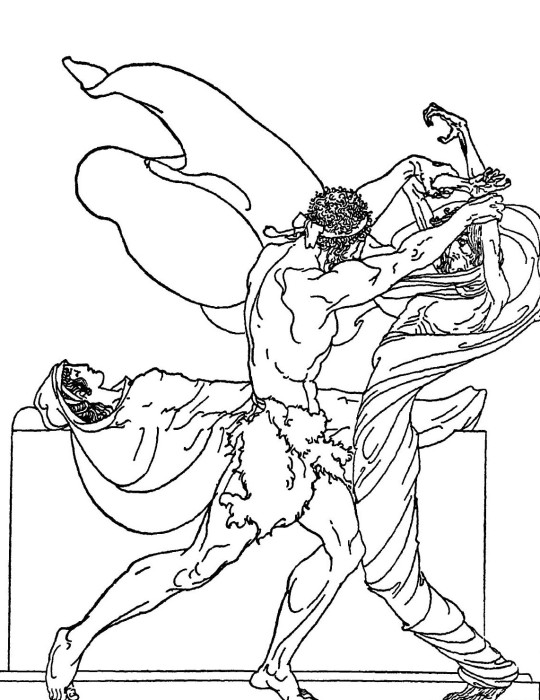

Illustrations from Padraic Colum's The Golden Fleece and the Heroes Who Lived Before Achilles by Willy Pogany (1921)
#willy pogany#art#illustration#golden age of illustration#1920s#1920s art#vintage art#vintage illustration#hungarian art#hungarian artist#books#mythology#greek mythology#iris#demeter#hercules#alcestis#death#medea#classic art
390 notes
·
View notes
Text
"You could come
to see me in my dreams and comfort me. For they
who love find a time's sweetness in the visions of night."
Euripides, Alcestis
#Euripides#Alcestis#love#love quotes#dreams#dreaming#dream quotes#comfort#sweetness#night#nighttime#Ancient Greek literature#Ancient Greek drama#drama#drama quotes#tragedy#tragedy quotes#quotes#quotes blog#literary quotes#literature quotes#literature#book quotes#books#words#text
34 notes
·
View notes
Text

#admetus#alcestis#apollo#apollo x admetus#admetus x alcestis#greek mythology#greek gods#greek myth memes#meme#memes#i found this piece of meme in the wild and immediately thought of this#don't worry ApoHya is still first place in my OTP list#i just wanna give some attention to Apollo and Admetus#their myth is cute even when they don't end up together#and Alcestis is best girl gotta love her too
68 notes
·
View notes
Text

Hercules and Alcestis by Eugène Delacroix
#hercules#alcestis#underworld#art#eugène delacroix#hades#greek mythology#princess#death#europe#european#antiquity#classical antiquity#mythology#mythological#greek#greece#ancient greece#ancient greek#ancient world#ancient#history
57 notes
·
View notes
Text

Silly art meme on twit!
But with my OCs/Tabletop characters, Regina and Alcestis
#its ok if they were in the same campaign theyd be best friends#regina#alcestis#moth girl#oc#open legend#dnd#dungeons and dragons#fantasy#my art#illustration
51 notes
·
View notes
Text
greek tragedy (mostly familicide bc that's my thesis) as textposts again bc i can't stop myself




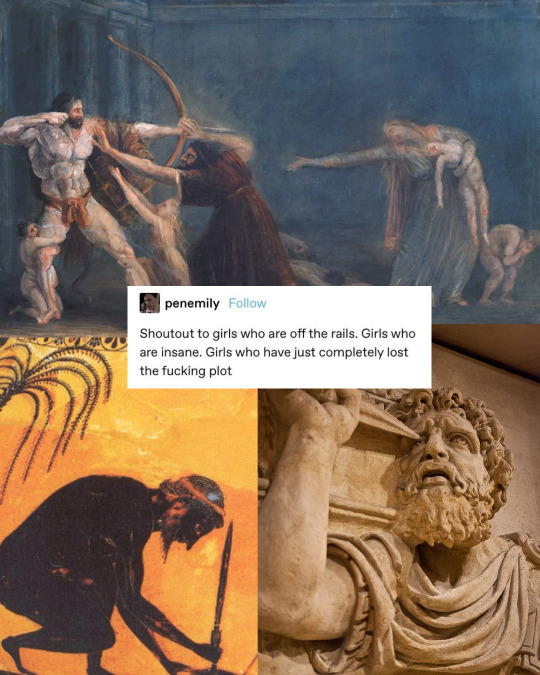

(pt1)
Kreusa and Ion - Ion // Orestes - Oresteia
Alkestis - Alkestis // Iphigeneia - Iphigeneia in Aulis
Herakles/Ajax/Oedipus - Herakles/Ajax/Oedipus Tyrannus // Klytaimnestra - Agamemnon
#tagamemnon#ion#oresteia#alcestis#iphigenia#heracles#ajax#oedipus#clytemnestra#agamemnon#sophocles#euripides#aeschylus
12 notes
·
View notes
Text

Apollo wingmaning his boyfriend is one of my favourite parts of Admetus' myths.
I have to draw them like this
434 notes
·
View notes
Text
Just reread Katherine Beutner's Alcestis. I had read it first in 2013 and remember being quietly impressed by it; I wanted to see if it held up and, if so, what made it different from the current crop of awful Greek mythology retellings.
The answer to the first question is...partially. it's certainly not insufferable like the more recent retellings - it has an understated tone, solid attention to detail, and characterization that, while not extraordinary, certainly has more nuance than Natalie Haynes et al.
It has some problems with structure and pacing, especially in the second half, which is concerned with Alcestis' time in the underworld. I liked some details of Beutner's underworld, but I thought it was largely unimaginative, and a number of things didn't work for me (she has Alcestis encounter the ghost of Tiresias, who gives her what sound like flat imitations of enigmatic prophecies. There was no reason for him to be there). And I have major problems with her Persephone, who - surprise of all surprises! - reveals to Alcestis that she wasn't actually raped.
What I was most struck by the first time and was again on reread was the novel's attention to and interest in sex between gods and mortals, both in the relationship between Admetus and Apollo and, later, between Alcestis and Persephone. The moments when Alcestis catches glimpses of Admetus and Apollo together were the richest parts of the book to me - the sense of Apollo's numinous unknowability, Alcestis' experience of mingled fascination and envy at her own exclusion.
When Alcestis, in the underworld, experiences similar attentions from Persephone (which, my issues with characterization aside, was really hot), this should sharply parallel what she has witnessed between her husband and the god; her own combination of compulsion and desire, the way divine sex makes everything else seem faint and unreal, should also help her understand what was happening for Admetus when he struggled during sex with her or involuntarily called Apollo's name.
Maybe this is what Beutner wanted to do, but she doesn't quite go there; the novel ends on a note of estrangement between the couple, which is a possible and perhaps the easiest reading of the Euripides, but it has previously not been what the novel is interested in, and indeed Admetus' cowardice and desperation to escape death, which takes up so much of the play, is downplayed here. If this book was written within the past six years that would be the whole story, and it would proclaim that this blatantly obvious reading was previously 'untold.' I like that this novel didn't go there. But I wanted a moment of recognition between Alcestis and Admetus at the end - maybe not love or desire or reconciliation, but even just recognition.
18 notes
·
View notes
Text
ὡς τοῖς γε σεμνοῖς καὶ συνωφρυωμένοις
ἅπασίν ἐστιν, ὥς γ᾽ ἐμοὶ χρῆσθαι κριτῇ,
οὐ βίος ἀληθῶς ὁ βίος ἀλλὰ συμφορά.
"When it comes to those who are arrogant or miserable,
it's my belief that such a life is not really a life;
it's nothing but catastrophe."
— Euripides, Alcestis
#classics#classical literature#classical languages#ancient greek#ancient greece#greek tragedy#euripides#alcestis#euripidesposting#quote from heracles btw#translations#ancient greek translations
25 notes
·
View notes
Text


thinking about alcestis
#apollo#thanatos#greek mythology#greek myths#greek gods#greek myth art#greek mythology fanart#alcestis#arties art
16 notes
·
View notes